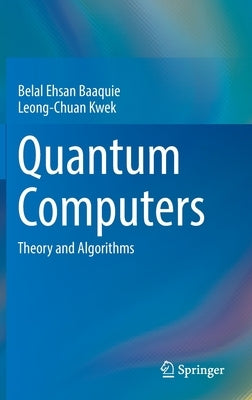Before you leave...
Take 20% off your first order
20% off
Enter the code below at checkout to get 20% off your first order
Discover summer reading lists for all ages & interests!
Find Your Next Read

1 Introduction
2 Classical Computer
2.1 Binary Representation
3 Quantum Computer
3.1 Qubit
4 Classical Gates and Circuits
5 Quantum Gates and Circuits
5.1 Hilbert space
5.2 Measurement
6 Deutsch Algorithm
7 Grover Algorithm
7.1 Grover algorithm: two-qubit
7.2 Grover algorithm: n-qubit7.3 Grover diffusion and rotation gate G
7.4 Single Recursion: Two qubit
8 Deutsch-Josza Algorithm
9 Simon's Algorithm
9.1 Quantum Algorithm9.2 An Illustrative Example
10 Quantum Fourier Transform (QFT) 51
10.1 Quantum circuit of QFT
11 Shor
11.1 Introduction
11.2 Understanding the classical algorithm
11.3 Quantum algorithm
12 Option Pricing
12.1 Quantum Algorithm for Option Pricing
12.2 Quadratic Improvement
12.3 Estimation of Phase
12.4 Call Option
13 Solving Linear Equations
13.1 Introduction13.2 Harrow-Hassidim-Lloyd Algorithm
13.3 Specific Example
13.4 Other applications
14 Quantum-Classical Hybrid Algorithms
14.1 Why bother?
14.2 Overlap of Wavefunctions14.3 Variational Quantum Eigensolvers
15 Quantum Error Correction
15.1 Introduction
15.2 Simple quantum errors
15.3 Kraus Operators
15.4 Nine-qubit Code15.5 General properties of quantum error-correcting codes
15.6 Classical Linear Codes
15.7 CSS Codes
16 Efficiency of a Quantum Computer
16.1 So where does quantum computation take place?
16.2 Conclusions16.3 Acknowledgements
Prof. Belal Ehsan Baaquie holds a B.S. in Physics from Caltech and a Ph.D. in Theoretical Physics from Cornell University, USA. His main research interest is in the study and application of the mathematical methods of quantum field theory. He has applied the mathematical formalism of field theory to finance and been a major contributor to the emerging field of quantum finance. His current focus is on developing the formalism of quantum finance and applying it to option pricing, corporate coupon bonds, and the theory of interest rates, as well as the study of equity, foreign exchange, and commodities; he has developed forecasting models for commodity prices. He is also applying methodologies from statistical mechanics and quantum field theory to the study of microeconomics and macroeconomics.
Leong-Chuan Kwek is a principal investigator at the Center for Quantum Technologies, NUS, the Co-Director of the Quantum Science and Engineering Center at NTU and a faculty of the National Institute of Education, Singapore. He is the Immediate Past President of the Institute of Physics, Singapore and a Council Member of the Association of Asia Pacific Physical Socieites. He is also an elected Fellow of the American Associaiton for the Advancement of Science (AAAS) and the Institute of Physics, UK (IOP).
Thanks for subscribing!
This email has been registered!
Take 20% off your first order
Enter the code below at checkout to get 20% off your first order